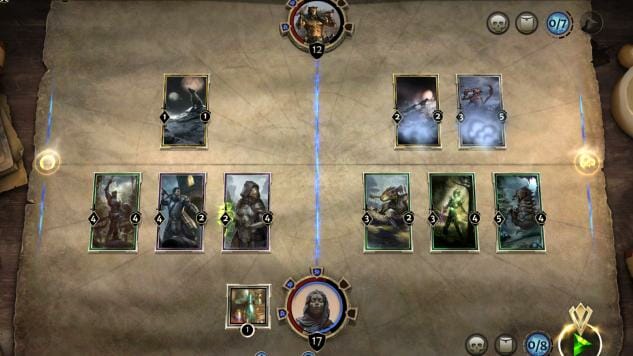I recently got a chance to play several chapters of the game, which is currently in Alpha, and while I’m not much for card strategy games, I decided to give it a shot in the interest of reinforcing and furthering my knowledge of The Elder Scrolls lore. It plays out a lot like Magic: The Gathering or Hearthstone, with a deck of collected cards serving as the primary means of combat, each with their own effects or bonuses. The challenge lies in playing the correct card at just the right moment to outmaneuver your opponent, and building and customizing a deck of powerful cards can take months to years, depending on the player.
I played the alpha for several days and while it functions as promised and offers an engaging new challenge in my growing repertoire of gaming skills, as a whole it fails to hold my interest. I think what Bethesda forgets is that these sorts of games are better suited to mobile simply due to what the audience is willing to accept in terms of quality. The mindless clicking and indiscriminate spending of a game like Hearthstone only works in a mobile setting. Folks expect better production values from a PC or console game but on mobile, most folks will accept flimsiness in exchange for having something to play for a few minutes while they’re bored. As a result, many players are willing to reduce the necessary time investment in order to avoid any long term commitment, lending itself to the “pay to win” model. This is completely antithetical to the appeal of The Elder Scrolls, a series whose charm lies mainly in is its lore. Its convoluted web of history is something to be appreciated over time, not thoughtlessly consumed in small blurbs on card descriptions or loading screens. With no system in place to tell a deeper story, the narrative of Legends is boring, offering little context for the cards and their basis in the Scrolls universe. Only players who are already well versed in the series will get anything out of it. Even those that are (like myself) will not find the game illuminating.
Other supporting features also fail to maintain the core appeal of the series, for example, the art is unappealing. It sticks to the bubbly, garish chintz of mobile game design and accents it with cheesy, subpar fantasy art that really can only be forgiven on a mobile phone. It lacks the regal sophistication of the Elder Scrolls aesthetic showcased in Skyrim and Oblivion and cheapens the experience. And while the practice mode provides a penalty-free space to learn the basics of the game, the rules and finer points are not laid out sufficiently during play. At times the card effects are not made clear, and none of the enemy bosses have descriptions laying out their unique abilities. This makes the completion of each chapter a trial and error process that can be frustrating for those who don’t have the time to waste.
Curious to see if my observations were on point, I invited my partner Alex, a passionate fan of both Hearthstone and The Elder Scrolls, to watch me play a few rounds. He was immediately put off by the interface’s strong resemblance to Hearthstone, and while he was able to pick up the gameplay immediately due to his experience with Hearthstone, he too was frustrated by the lack of clarification on card effects and boss abilities. We spent a few minutes scrolling through Hearthstone on Android and Legends on my PC, comparing the UI and features, and grew more disillusioned. As with Hearthstone, Legends allows you to create cards of your own, but have replaced their predecessor’s currency with a familiar Elder Scrolls staple, Soul Gems. This seemed almost illustrative of the game’s entire problem: it has swapped out key features of other card strategy games and slapped a coat of Elder Scrolls paint over it, and in a way that doesn’t necessarily make sense in the greater context of Elder Scrolls lore. At least with Elder Scrolls Online and Fallout Shelter, you could argue that the mechanics of the game, while differing from the core staples of their respective series, still support their franchises. But with Legends, the effect is more of a re-skin. The sole feature distinguishing it from Hearthstone are the lanes, which are hardly a necessary improvement. The whole thing comes off more like an Elder Scrolls-themed game than an Elder Scrolls game and that distinction is important. As with Elder Scrolls Online and MMORPGs, Legends is a little late in the strategy card game, and without serious course correction, it will contribute to Bethesda’s growing reputation as a trend-chaser. If they wish to maintain the integrity of their intellectual properties, they need to stop succumbing to the pressure to milk them for all they’re worth.
In terms of maintaining the Elder Scrolls identity, Legends is a setback. It does not respect the core appeal of the Elder Scrolls series, which is primarily valued for its aesthetics and story. It also fails to improve on the formula it seeks to model. During the few days I had with the game, significant updates have already been made, and as the game is in alpha, Bethesda still has the chance to make key tweaks to give Legends a unique identity among strategy card games. For now, stick with Hearthstone.
Holly Green is a reporter, editor, and semiprofessional photographer living in Seattle, WA. She is also the author of Fry Scores: An Unofficial Guide To Video Game Grub.
You can find her work at Gameranx, Polygon, Unwinnable
, and other videogame news publications.